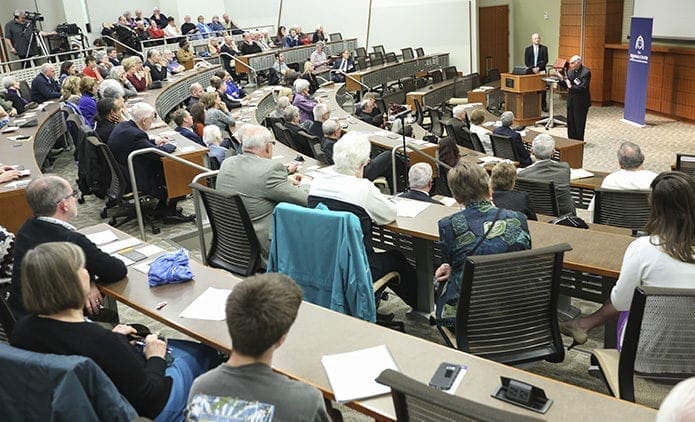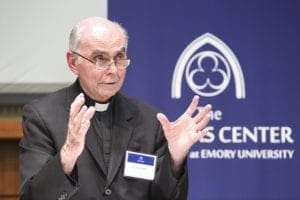 Photo By Michael Alexander
Photo By Michael AlexanderAtlanta
Aquinas Center kicks off series on roles and legacy of Pope Francis
By ANDREW NELSON, Staff Writer | Published March 8, 2018
ATLANTA—Pope Francis’ ministry leading the church for the past five years has focused on “justice in the world, mercy in the church,” according to a speaker at the Aquinas Center of Theology.
Desiring a church supporting people on the margins of society, Pope Francis wants to “shape a community of faith which has the capacity to demonstrate how faith can change the world,” said Father Bryan Hehir. He was the kickoff speaker, presenting “Pope Francis, the Church and the World” Feb. 19 as part of the center’s series on Pope Francis’ legacy at the upcoming anniversary of his papacy.
Cardinal Jorge Bergoglio was elected pope on March 13, 2013. His ministry has included an encyclical on the environment, washing the feet of a Muslim woman in a detention center, and encouraging church members toward a more pastoral path, with less focus on rules.
A survey by the Pew Research Center found that 84 percent of American Catholics have a favorable opinion of the pope. Nine out of 10 Catholics describe him as compassionate and humble.
Around 200 people heard the speech at Emory University by Father Hehir, a Harvard University professor. It was the first in a series to examine issues of importance to Pope Francis. Other speakers will discuss how the pontiff brings a South American perspective on the poor, his role as a global peacemaker and a feminine perspective on his call for a greater voice for women in the Catholic Church.
Father Hehir, who also serves on the staff of Cardinal Sean O’Malley of the Archdiocese of Boston, used broad strokes to cover the pope’s influence, both inside the church and on the world stage, from the pope’s life as a Jesuit priest to his vision for creating a church shaped by the Second Vatican Council.
“Behind the charisma is the project of shaping a church that is in pursuit of justice in the world and mercy in the church,” said Father Hehir.
Pope Francis is a man influenced by serving as a Jesuit priest in Argentina and then by his lifestyle as the archbishop of Buenos Aires where he came in frequent contact with the poor in the slums, he said.
“He wants to lift up parts of the world that usually get ignored,” said Father Hehir, noting the Holy Father’s globe-trotting trips to countries where Catholics are the minority and his efforts to diversify the college of cardinals, elevating bishops from countries like Laos, Sweden, Mali and El Salvador.
A church that stands where people suffer
On world issues, Pope Francis has focused on global problems that require cooperation to resolve. He draws attention by his words and deeds to inequality between the rich and poor, the environment, migration, along with war and peace, especially fueled by religious differences.
“He has tried to bend the arc of religious interaction away from war,” Father Hehir said.
Within the church, the pope is continuing the work of Vatican II by showing how it is “not only the pope that leads the church,” he said.

Father Bryan Hehir was the presenter for the eighth annual Major Catholic Speaker Series in the Claudia Nance Rollins Building auditorium at Emory University. During his Feb. 19 talk on Pope Francis, Father Hehir shared how the pontiff has focused on justice in the world and mercy in the Church. Photo By Michael Alexander
Father Hehir said Pope Francis’ oft-quoted line describing the church as a “field hospital on a battlefield” envisions the church standing with people.
“The church ought to stand at the intersection of human suffering,” Father Hehir said. “People can suffer in different ways. It isn’t only poor people who suffer. He wants the church sensitively pastoral, so it is able to stand at the peripheries where people suffer and offer various kinds of assistance.”
Pope invites people to speak freely
Another trait unique to Pope Francis is welcoming people with different views to disagree with him, he said. During the 2014 Synod of Bishops on the Family, Pope Francis told participants to speak freely about their views, when in the past, people have felt synods simply rubber-stamped a predetermined point of view, he said. The final document, “Amoris Laetitia” (The Joy of Love), continues to be debated on the question of whether civilly remarried Catholics, after a divorce, can receive communion
“He is complicated. He has invited debate about all the issues he talks about. And all of us are debating because he is dealing with such large issues. You can totally agree with the objectives and disagree about the means. But it is all about shaping a church that is both a source of justice and a source of mercy. And for that, this is a pontificate that blesses our time.”
Philip Thompson, executive director of the center, said Pope Francis has made “the church more relevant on issues like the poor, the environment, immigration, the death penalty and religious persecution.”
Catholics see Pope Francis seek out people who may be overlooked and spend time with them, like the man in the crowd in Rome whose head was covered in boils. The pope wants people to learn about the lives and circumstances of people who may be different, he said.
“Our first move to others must be mercy and accompaniment, not condemnation and rejection,” Thompson said.
Attendees left the Aquinas Center program with a deeper appreciation of the pope.
Eleanor Malone, a parishioner at Cathedral of Christ the King, Atlanta, said issues of inequality or the environment spotlighted by the pope can be too easily dismissed as either a religious issue or best left to politics.
“Somehow we need to get the two of them together” so problems can be addressed, she said.
Bernadette Naro, who worships at the Shrine of the Immaculate Conception, Atlanta, said believers should take the pope’s global concerns and make them parish concerns too. She said she’s fascinated by the idea of the church focused on mercy and justice in a way that helps people live their faith and improve their communities.